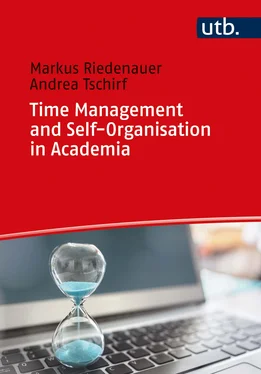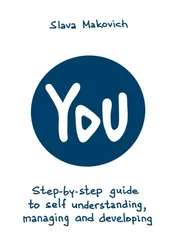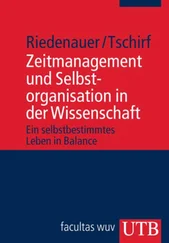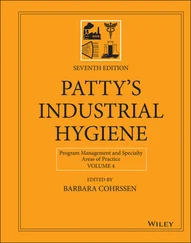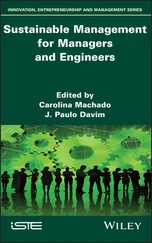Markus Riedenauer - Time Management and Self-Organisation in Academia
Здесь есть возможность читать онлайн «Markus Riedenauer - Time Management and Self-Organisation in Academia» — ознакомительный отрывок электронной книги совершенно бесплатно, а после прочтения отрывка купить полную версию. В некоторых случаях можно слушать аудио, скачать через торрент в формате fb2 и присутствует краткое содержание. Жанр: unrecognised, на английском языке. Описание произведения, (предисловие) а так же отзывы посетителей доступны на портале библиотеки ЛибКат.
- Название:Time Management and Self-Organisation in Academia
- Автор:
- Жанр:
- Год:неизвестен
- ISBN:нет данных
- Рейтинг книги:5 / 5. Голосов: 1
-
Избранное:Добавить в избранное
- Отзывы:
-
Ваша оценка:
- 100
- 1
- 2
- 3
- 4
- 5
Time Management and Self-Organisation in Academia: краткое содержание, описание и аннотация
Предлагаем к чтению аннотацию, описание, краткое содержание или предисловие (зависит от того, что написал сам автор книги «Time Management and Self-Organisation in Academia»). Если вы не нашли необходимую информацию о книге — напишите в комментариях, мы постараемся отыскать её.
Time Management and Self-Organisation in Academia — читать онлайн ознакомительный отрывок
Ниже представлен текст книги, разбитый по страницам. Система сохранения места последней прочитанной страницы, позволяет с удобством читать онлайн бесплатно книгу «Time Management and Self-Organisation in Academia», без необходимости каждый раз заново искать на чём Вы остановились. Поставьте закладку, и сможете в любой момент перейти на страницу, на которой закончили чтение.
Интервал:
Закладка:
•What does ‘success’ mean to me in research, teaching, and administrative work?
•How can I measure it?
•When do I get feedback ‘along the way’ that I am on the right path and making progress?
•Where can I build in additional encouragement stations like these?
For large projects and tasks, define partial goals that you review at predefined dates in order to raise awareness and to celebrate partial successes (see Chapter IVfor more detail, especially under ‘Achieving goals’ and ‘Evaluation’)!
Frequently, an obstacle is that other people’s expectations and quality requirements are not quite clear, so that you do not know when your research or teaching can be considered successful. Many working on a master’s or magister thesis, and many doctoral candidates, are unsure if their writing is meeting the relevant criteria for a good text in their field. Without a doctoral group or something similar, collegial feedback is rare, or one does not dare to ask continually for comments.
What qualifies as a good lecture or a successful seminar is somewhat clearer, and meanwhile more emphasis is placed on regular teaching evaluations that provide a guideline. Nevertheless, the question remains of realistic targets beyond the students’ expectations and your own ideal image of a university lecturer or instructor: How do you prepare for and complete teaching obligations while having enough time and energy for your other tasks?
You must answer these questions yourself—especially if you face too many or even contradictory expectations. If you feel left alone due to a lack of feedback and assessment of your work by others, you should specifically ask for a response and not grope in the dark full of self-doubt.
A certain amount of trial and error seems to be part of academic freedom, and trying new things has value: subjectively, insofar as it is enjoyable, and objectively, as it generates innovation. But also see the limits: Routine tasks can be done following proven patterns and criteria. Do not strain your creativity and time in areas where the experience of others can make your work easier.
Many scholars also see their profession as a vocation, insofar as their work corresponds to their intrinsic interests and talents and to what they want to realise in life. This is matched by the relatively high degree of self-determination, which is why people gladly accept that they must work at home, in the evenings, and on weekends. The trap, however, is that work and private life intertwine too much without maintaining a rhythm of time conducive to a healthy life. The ‘home office’ no longer has a noticeable distinction (only ‘office’, no longer ‘home’). Women scholars with children come under extra pressure in this context, but so do couples who both work at a university. Life relationships and children suffer as well as friendships, health, and recreation. The 2020 pandemic and the countermeasures exacerbated the situation for many people.
•How do I set the boundaries between work and private life?
•Do I feel a distinction between my various roles?
•What rhythms—especially daily and weekly—do I maintain?
So far, we have thought about challenges arising from academic freedoms. But then this profession also has specific difficulties and constraints directly opposed to these freedoms.
In theory, you are self-directed and personally responsible for your work, but in practice you must submit to the person guiding you or your research team. Or, external factors dictate your schedule, such as vegetation cycles in biology.
If you have an assistantship position supporting the completion of your doctorate, then your main task is writing your dissertation; however, at the same time your doctoral advisor and first examiner may serve as your supervisor at the institute and demand too much of your time for cooperating and assisting with many other tasks (called ‘burning out your assistants’). Such dual commitments can be fatal if you fear falling out of favour and being judged less positively by saying ‘no’. Language also expresses this lack of freedom: Strictly speaking, you can neither independently write a dissertation nor promote yourself to a doctoral title, but you can only be granted a doctorate. In general, both official and unofficial hierarchies call into question many aspects of freedom.
Tension results from your different roles: Towards students and as a member of the international ‘scholarly community’, you need to appear independent, confident, and self-assured—but structurally and legally you are often treated as dependent and without autonomy, sometimes having to prove yourself constantly. 2Even those who have made it through this phase need additional skills and legal knowledge, especially for negotiations. The struggle to acquire these skills will take time and can result in stress.
Younger scholars in the qualification phase often have less freedom because they must pursue other activities to earn a living. Above all, medical practitioners have several ‘jobs’ in research and teaching, clinical practice, and working or substituting in a surgery.
In a very competitive environment, with constant evaluations and appraisals of your projects and results, your career can feel like a one-way street with many stop signs. You can no longer turn around, but every crossroads has the risk of not extending a fixed-term contract and of ending your career. The many temporary contracts without the prospect of tenure or tenure-track status (which has generally been abolished in Austria) have led to an academic precariat. 3The freedom then consists in being ‘freely and fully released’, perhaps after only a few years. Those who finally make it to a professorship do so at an average age of about 40 years in Germany—so the time to become established is extremely long. Where uncertainties about the professional future become widespread, motivation begins to falter.
After all, the fundamental self-determination of when and what to write and publish faces a soft but constant time pressure: no one can escape the de facto principle of ‘publish or perish’. Deadlines for submitting written papers or contributions to anthologies and journals as well as reviews often lie more than a year in the future. This leads to careless and unplanned commitments that cause stress when the deadline approaches.
List the institutional and external factors that limit your freedom! Consider external constraints due to teamwork, dual commitments, several simultaneous jobs, pressure due to constant evaluations, time contracts, perceived compulsion to publish, ...
Consequences
The academic freedoms, their internal problems as well as the typical constraints outlined previously, result in an enormous demand for personal responsibility—perhaps more than in any other profession. You can and must select, develop, and structure projects, define quality benchmarks, set priorities, and implement all this with a great deal of perseverance and discipline and often with little support. The planning horizon covers several years, during which you must not lose your intrinsic motivation.
There are three levels of motivation: The basic level consists of the need to survive and to acquire the necessary means for survival. The second level, namely external motivation through punishments and rewards (milder forms include criticism and praise or recognition), is in the long run not sufficient for getting through the lengthy qualification phase. Ultimately, one depends on other people’s goodwill, acceptance, and fairness.
The highest motivational level is self-motivation due to mastery, autonomy, and meaning. 4On these three factors, scholarly activity scores quite well: After all, scholarship is based on knowledge and its application; moreover, despite all institutional and informal constraints, scholars are allowed an above-average measure of self-definition. However, this motivational factor of autonomy does not ensure achieving an appropriate, stable, growth-conducive place within the system. As far as the third intrinsic factor is concerned, beyond Bachelor’s, Magister’s, or Master’s degrees, people choose scholarship as a profession because they recognise a meaning that goes beyond immediate usefulness—whether it be, classically speaking, the finding of truth, the identification of beauty, or the promotion of good.
Читать дальшеИнтервал:
Закладка:
Похожие книги на «Time Management and Self-Organisation in Academia»
Представляем Вашему вниманию похожие книги на «Time Management and Self-Organisation in Academia» списком для выбора. Мы отобрали схожую по названию и смыслу литературу в надежде предоставить читателям больше вариантов отыскать новые, интересные, ещё непрочитанные произведения.
Обсуждение, отзывы о книге «Time Management and Self-Organisation in Academia» и просто собственные мнения читателей. Оставьте ваши комментарии, напишите, что Вы думаете о произведении, его смысле или главных героях. Укажите что конкретно понравилось, а что нет, и почему Вы так считаете.
